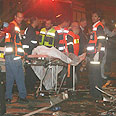
Tel Aviv bombing - Four people killed
צילום: עופר עמרם
How do you tell them?
Linda Buzaglo, who lost her husband, and Ofir Gonen, whose fiancee was killed, are recovering from wounds sustained in the Tel Aviv bombing; soon they will have to be informed their loved ones are no longer alive
TEL AVIV - The relatives of two victims killed in the Tel Aviv bombing Friday are coping with yet another trauma - The life partners of both victims have sustained serious injuries in the blast and have not yet been informed their loved ones are no longer alive.
Linda Buzaglo, 32, lost her husband Yitzhak in the attack, awhile Ofir Gonen lost his fiancée Yael Orbach, but both are still in hospital recovering from wounds sustained in the attack.
In the coming days, depending on their condition, their relatives and hospital social workers would have to face them and share the worst news of all.
There are is more than one way to tell the news, as every case is different, says Ichilov hospital social worker Doron Vilner.
“In many cases, following such severe physical trauma, the patient’s connection to his own pain is so powerful that he cannot yet relate to other events,” he says.
Dilemmas within the family
Medial staff enlist the help of family members in order to learn about the injured individual and his character, Vilner says.
However, consulting with relatives often raises difficult dilemmas within the family, he says.
“At times, several relatives want to refrain from sharing the bad news for as long as possible, while others want to inform the patient as fast as possible,” Vilner says.
If patients asks about the well-being of their loved ones, he says, they are always told the truth, even if it is painful.
“If their medical condition allows for it and they ask, we’ll tell them the truth as quickly as possible,” he says. “We won’t lie, because you cannot feed them lies.”
However, receiving the bad news while still battling injuries could compromise the healing process, Vilner says.
“Bereavement undermines the ability to recover,” he says. “When we are talking about the death of children or a life partner, the blow is even harder.”
‘Treatment does not take the pain away’
Nonetheless, Vilner says, if the secret is kept for too long, the patient will eventually find out about it under unfavorable circumstances.
“The patient is surrounded by dozens of medical team members during the recovery, you can’t keep a secret like this,” he says.
Once the initial recovery period is over, Vilner says, family members are invited to continue with social and psychological treatment.
“It’s part of the service we provide,” he says. “The treatment does not take away the pain and sorrow.”










